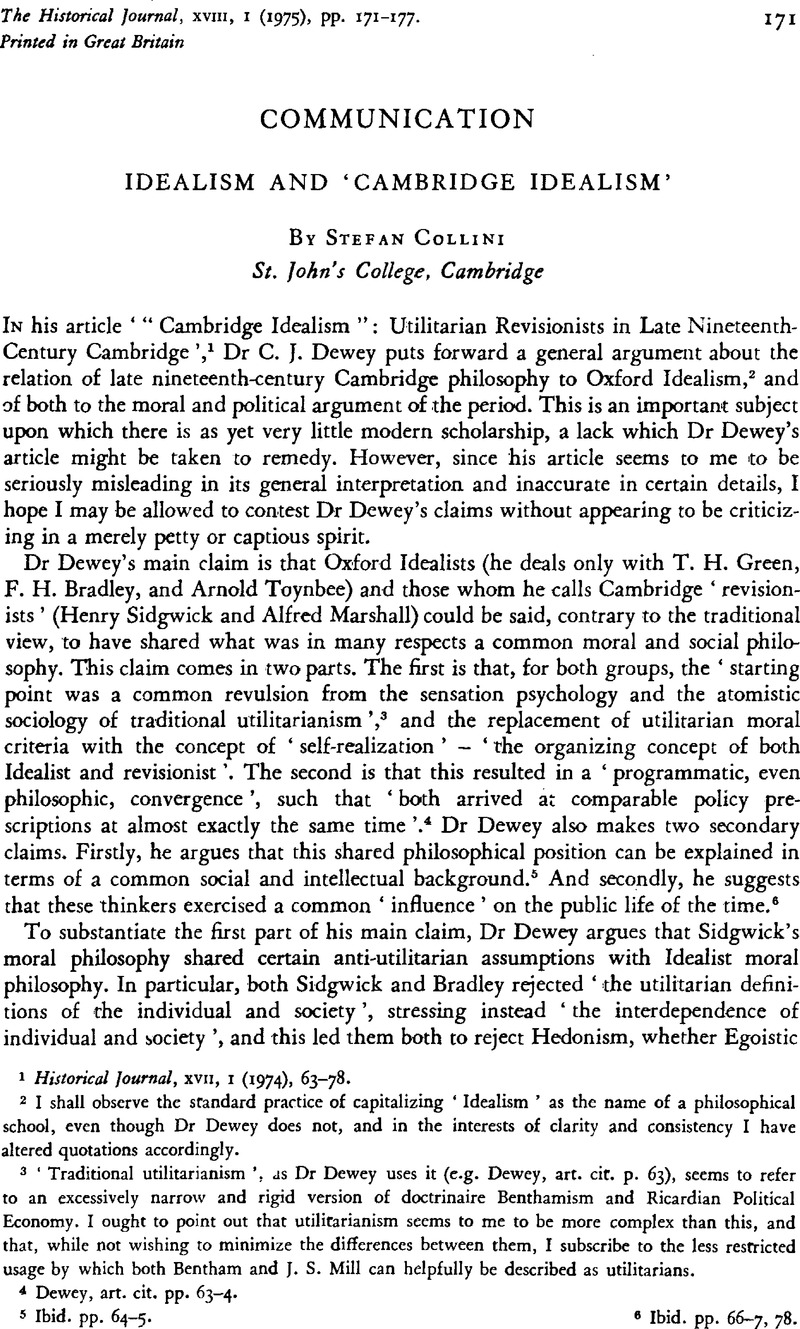Article contents
Idealism and ‘Cambridge Idealism’
Published online by Cambridge University Press: 11 February 2009
Abstract

- Type
- Communication
- Information
- Copyright
- Copyright © Cambridge University Press 1975
References
1 Historical Journal, xviii, 1 (1974), 63–78.Google Scholar
2 I shall observe the standard practice of capitalizing ‘Idealism’ as the name of a philosophical school, even though Dr Dewey does not, and in the interests of clarity and consistency I have altered quotations accordingly.
3 ‘Traditional utilitarianism’, as Dr Dewey uses it (e.g. Dewey, art. cit. p. 63), seems to refer to an excessively narrow and rigid version of doctrinaire Benthamism and Ricardian Political Economy. I ought to point out that utilitarianism seems to me to be more complex than this, and that, while not wishing to minimize the differences between them, I subscribe to the less restricted usage by which both Bentham and J. S. Mill can helpfully be described as utilitarians.
4 Dewey, , art. cit. pp. 63–4.Google Scholar
5 Ibid. pp. 64–5.
6 Ibid. pp. 66–7, 78.
7 Ibid. pp. 69, 68.
8 There are rather a number of such small errors, several doubtless typographical: ‘self relation’ for ‘self-realisation’ on p. 66 n. 7; ‘historically’ for ‘rhetorically’ and ‘Piety’ for ‘Duty’ in the quotation on p. 71; a sentence omitted from the quotation from Green on p. 72; the transposition of ns. 34 and 35 on p. 75. The quotation cited on p. 75 as from pp. 551–2 of the 1st ed. of Sidgwick's Elements of Politics does not seem to be there, nor can I find the passage cited on p. 72 as p. 82 of the 4th ed. of that work. The very brief chronology of Sidgwick's life given on p. 64 n. 3 manages to get wrong both the date of his election to his professorship (1883 not 1882) and the date of his death (1900 not 1899); j n d x 's n o t t r u c t n a t both Green and Sidgwick ‘were elected to fellowships in 1861’, since Sidgwick became a Fellow of Trinity in 1859 and Green a Fellow of Balliol in i860. (See A., and S[idgwick, E. M.], Henry Sidgwick: A Memoir (London, 1906), p. 42;Google Scholar and Richter, Melvin, The Politics of Conscience: T. H. Green and His Age (London, 1964), p. 84).Google Scholar
9 Bradley, F. H., Ethical Studies (London, 1876), pp. 114–17.Google Scholar
10 Sidgwick, H., The Methods of Ethics (London, 1874), p. 377.Google Scholar
11 Mind, O.S. i (1876), 545–9.Google Scholar
12 Mind, O.S. ii (1877), 122–5.Google Scholar cf. Sidgwick, , Methods of Ethics, p. 374.Google Scholar
13 Bradley, F. H., Mr Sidgwick's Hedonism: An Examination of the Main Arguments of ‘The Methods of Ethics’ (London, 1877), p. 58.Google Scholar
14 Dewey, , art. cit. p. 70.Google Scholar
15 Bradley, , Ethical Studies, p. 158Google Scholar
16 Sidgwick, , Methods of Ethics, p. 464.Google Scholar
17 Ibid (2nd ed., 1877), pp. 175–6 and n. Cf. Dewey, , art. cit. p. 71.Google Scholar
18 Sidgwick, , Methods of Ethics (2nd ed., London, 1877), p. xii.Google Scholar
19 A., and S[idgwick, E. M.], Henry Sidgwick, p. 284.Google Scholar
20 Dewey, , art. cit. pp. 69, 72, 74 (my italics).Google Scholar
21 Ibid. p. 73.
22 Sidgwick, H., The Elements of Politics (London, 1891), p. 81.Google Scholar
23 Ibid. pp. 38–9.
24 He is just slightly ambiguous on this, but see the references to ‘individualism’ in the index (which frequently denote passages referring to ‘laissez-faire’), and see especially, p. 137.
25 Ibid, p. 139. He allows that in a few, very carefully defined cases an argument could be made out for some ‘socialistic’ legislation.
26 Ibid. pp. 34, 35 and n.
27 A., and S[idgwick], E. M., Henry Sidgwick, p. 439.Google Scholar
28 Dewey, , art. cit. p. 76.Google Scholar
29 Ibid. p. 77.
30 Spencer, Herbert, The Principles of Ethics (London, 1893), ii, 251.Google Scholar
31 The one further piece of evidence which Dr Dewey brings forward to buttress his claim about Marshall's Idealism is that he succeeded Toynbee in his tutorship at Balliol. Thus ‘Marshall's Idealist credentials were verified at the jons et origo of Idealism’ (Dewey, , art. cit. p. 77;Google Scholar cf. p. 64 n). I am not quite sure what rhis sentence means but the mere fact that he succeeded Toynbee in his Tutorship is no more evidence of Marshall's Idealism than the fact that he succeeded Fawcett in his Chair at Cambridge is evidence of his utilitarianism.
32 Dewey, , art. cit. pp. 75–6.Google Scholar
33 A., and S[idgwick], E. M., Henry Sidgwick, p. 36.Google Scholar
31 Ibid. p. 39; Coats, A. W. (ed.), The Classical Economists and Economic Policy (London, 1971), p. 31;Google ScholarHutchison, T. W., A Review of Economic Doctrines 1870–1929 (Oxford, 1953), p. 52.Google Scholar
35 Having argued at one point that ‘Sidgwick rendered utilitarianism invulnerable to Idealist attack by stealing his opponents' clothes’ (at least this acknowledges that Sidgwick regarded the Idealists as his ‘opponents’), Dr Dewey does later admit that ‘with Sidgwick's death it [utilitarianism] ceased to exist as a living philosophic system’ (Dewey, , art. cit. pp. 76–7).Google Scholar If the second statement is true, as it seems to me to be, broadly speaking, then the first must appear doubtful. Surely it is the case that Sidgwick tried to defend a form of utilitarianism, though certainly not by stealing his opponents' clothes – he would not have been caught dead in the gaudy finery of Idealism – but that it was a largely unsuccessful rearguard action. The force of academic philosophical opinion was increasingly against him, and after his death utilitarianism did indeed lacksignificant philosophical representation. I am at a loss to see how Dr Dewey reconciles this account of Sidgwick's relation to his contemporaries with his main claim about Sidgwick's innovatory, ‘Idealist’, revisionism.
36 Dewey, , art. cir. p. 64.Google Scholar
37 Ibid. p. 64.
38 Ibid. p. 78.
39 Ibid. p. 78.
- 4
- Cited by


